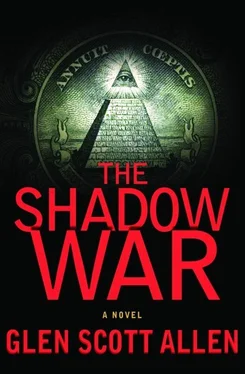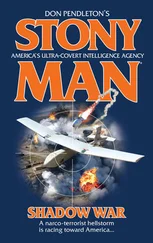Glen Allen - The shadow war
Здесь есть возможность читать онлайн «Glen Allen - The shadow war» весь текст электронной книги совершенно бесплатно (целиком полную версию без сокращений). В некоторых случаях можно слушать аудио, скачать через торрент в формате fb2 и присутствует краткое содержание. Жанр: Триллер, на английском языке. Описание произведения, (предисловие) а так же отзывы посетителей доступны на портале библиотеки ЛибКат.
- Название:The shadow war
- Автор:
- Жанр:
- Год:неизвестен
- ISBN:нет данных
- Рейтинг книги:5 / 5. Голосов: 1
-
Избранное:Добавить в избранное
- Отзывы:
-
Ваша оценка:
- 100
- 1
- 2
- 3
- 4
- 5
The shadow war: краткое содержание, описание и аннотация
Предлагаем к чтению аннотацию, описание, краткое содержание или предисловие (зависит от того, что написал сам автор книги «The shadow war»). Если вы не нашли необходимую информацию о книге — напишите в комментариях, мы постараемся отыскать её.
The shadow war — читать онлайн бесплатно полную книгу (весь текст) целиком
Ниже представлен текст книги, разбитый по страницам. Система сохранения места последней прочитанной страницы, позволяет с удобством читать онлайн бесплатно книгу «The shadow war», без необходимости каждый раз заново искать на чём Вы остановились. Поставьте закладку, и сможете в любой момент перейти на страницу, на которой закончили чтение.
Интервал:
Закладка:
"NKVD?" Benjamin asked.
"I forget, not everyone knows such things," she said. "NKVD was what came before KGB. Before that it was GPU, and before that it was Cheka. Now it is FSB. The letters change, the job is the same. Understandable?"
Benjamin nodded, and Natalya continued.
"At first, the prisoners stripped the pine trees of their branches up to about thirty meters and built many small buildings, scattered about. They wanted the pine trees to hide the buildings. I have seen photographs. It looked like a summer camp for students. And then they sent their best scientists here. Sakharov, Kurchatov, Kikoin."
"Like Los Alamos," Benjamin said, "out in the American desert, where they sent the American scientists."
"Well, not quite," she said. "Dubna was a sharashka, a special camp for scientists. The NKVD was in charge of everything. That is how my grandfather came to be here."
"Your grandfather?"
Natalya looked at him.
"I will explain later. Perhaps." Then she went to a nearby telephone and called her aunt's number. She spoke for a while, then returned to Benjamin.
"Now, we should go to the hotel."
"Won't that be dangerous? We'll have to register."
"Olga said there is a convention of physicists in town, for the Joint Institute of Nuclear Research. It's very famous. They created a new element there, element 105, which they called, of course, dubnium. Anyway, the town is stuffed with scientists from all over the world. Two more foreigners will hardly be noticed."
So they took a taxi to the Dubna Otel. Along the way, Benjamin saw that parts of Dubna were quite charming: rows of forties-style apartment buildings all painted yellow, and many separate houses, some of them rather large and constructed in a classical style not dissimilar to American turn-of-the-century mansions; these were painted in pastel reds, blues, and of course more pale yellow.
At the Otel, the lobby was filled with men and women, all of them looking very academic, and all of them engaged in intense conversations. No one took any notice of them.
At first, the clerk told Natalya there were no rooms to be had, due to the convention. Then Benjamin thought to bring out their press credentials, and Natalya, following his lead, explained they were there to cover the convention for the international press and that their paper would pay a donation to the hotel for finding them space. Once the "donation" had changed hands, an empty room was suddenly discovered.
"Guy's friend was right," Benjamin said, holding up the press credentials. "These are a bonus."
As they were walking through the lobby, Benjamin came to an abrupt stop. He was staring at an enormous frieze on one of the walls. It displayed a forest, obviously meant to represent the surrounding forests of pine trees, but there were also numerous figures and geometric shapes, some he guessed were meant to be people, but others he couldn't interpret.
"What on earth…?"
"Part of Soviet iconography," Natalya said. "It is a sort of map of Dubna. That large arc is the Ivankovo Dam, that circle is the institute, that squiggle is the Volga River, and that triangle, that is the largest statue of Lenin in the world, where the Volga and the Moscow Canal meet."
"How do you get all that from this… geometry lesson?"
"It was a very popular kind of Soviet art in the late sixties, when this hotel was built. Now come on, please," she said, tugging on his arm and pulling him toward the elevators. "We should get to the room."
Once in their room they unpacked. Their purchases included parkas, sweaters, and other warm clothing, as well as casual clothes, everything they needed for their dual roles of vacationing newlyweds and working journalists. Natalya changed into a black turtleneck, matching pants, and dress boots. Benjamin was more conservative in wool pants, a white cable-knit sweater, and brown shoes.
"Tres chic," he said, looking Natalya over.
"Not too chic, I hope," Natalya said. "The point is to be invisible."
He wanted to pull her to him, to pick up where they'd left off in Cannes the night before-but he sensed that she was in no such mood right now, and so he agreed to follow her down to the hotel bar.
Once there, they elbowed their way to a table with their drinks-he'd surprised himself by ordering scotch, while she'd selected vodka-and sat down. Given the high background noise in the bar, Benjamin thought it was as safe a place as any to talk.
"What did Olga say about your father?" he asked once they were seated.
"We are to meet him tomorrow. But not at his apartment. He has been staying…" and she smiled, "in a church."
"Church? Where?"
"Ah," Natalya said, "the very one where I was baptized. In Ratmino."
"Huh," Benjamin said. "And he trusts the priest there?"
"He is being cautious," answered Natalya. "It is his training. Or perhaps it is simply, like history, in his blood." She grew silent again, looked away.
"Look," Benjamin said, "ever since we got on the plane this morning, you've been acting-"
Natalya nodded. "I am sorry," she said.
She looked up at him, placed her hand over his. "It has nothing to do with last night, Benjamin, believe me. It is simply returning here."
"To Russia?" he asked.
"Well, yes," she said. "But more than that, to Dubna."
"I thought you grew up in Uzhur, in Siberia?"
She looked at him for a moment. "All right," she said. "Perhaps it is time to explain a little of my family's history. But if we are going to do that, we might as well order something to eat."
And so they ordered dinner. Natalya asked for kulebyakas, pies filled with meat and cabbage, and side dishes of salted cucumbers and sauerkraut. Benjamin decided to try their stroganoff. They also ordered a red Moldavian wine that Benjamin thought tasted almost like a burgundy, only sweeter. And then, with their meal started and the wine poured, Natalya said she was ready to tell Benjamin her family's darkest secret.
"I mentioned that my grandfather-my father's father-came to Dubna, to help build the Russian atomic bomb. But he wasn't a scientist. He was NKVD. He was one of the scientists'… supervisors."
"So, he was secret police?" Benjamin asked. "That's the dark secret?"
"Wait. You see, the assignment here was considered a… reward. For the work he'd done for the NKVD before the war."
"And that was?"
"Arresting people," she said, looking at him steadily. "Arresting people to be shot." She let that sink in for a moment. "He was a driver of one of the 'black crows,' the dark vans that moved around the streets of Moscow at night during the purges of the thirties. He drove dozens to their deaths… and worse."
Natalya took a long drink of her wine.
"Natalya," Benjamin began, "if you feel guilty…"
"There's more," Natalya said, interrupting him. Her face had grown grim, her eyes wouldn't look at him. "I said it was my family's secret. I meant my entire family. My other grandfather was also NKVD. Only he was a prosecutor, in a camp called Magadan, on the Sea of Okhotsk. One of the most terrible of all the camps. Thousands of prisoners died there. My grandfather was responsible for sentencing men to years of hard labor mining gold or building railways. Or to more immediate… punishment."
Benjamin was momentarily stunned. He looked at Natalya, at her fierce, bright beauty; it was impossible for him to think of anyone of her family doing such things.
What sort of comfort could he offer to someone suffering under the guilt of crimes committed by relatives so long ago? Crimes she'd had no part of committing?
"When did you find all this out?" he asked finally.
"I myself did not learn of this history until after perestroika, after my father resigned from the army."
Читать дальшеИнтервал:
Закладка:
Похожие книги на «The shadow war»
Представляем Вашему вниманию похожие книги на «The shadow war» списком для выбора. Мы отобрали схожую по названию и смыслу литературу в надежде предоставить читателям больше вариантов отыскать новые, интересные, ещё непрочитанные произведения.
Обсуждение, отзывы о книге «The shadow war» и просто собственные мнения читателей. Оставьте ваши комментарии, напишите, что Вы думаете о произведении, его смысле или главных героях. Укажите что конкретно понравилось, а что нет, и почему Вы так считаете.












